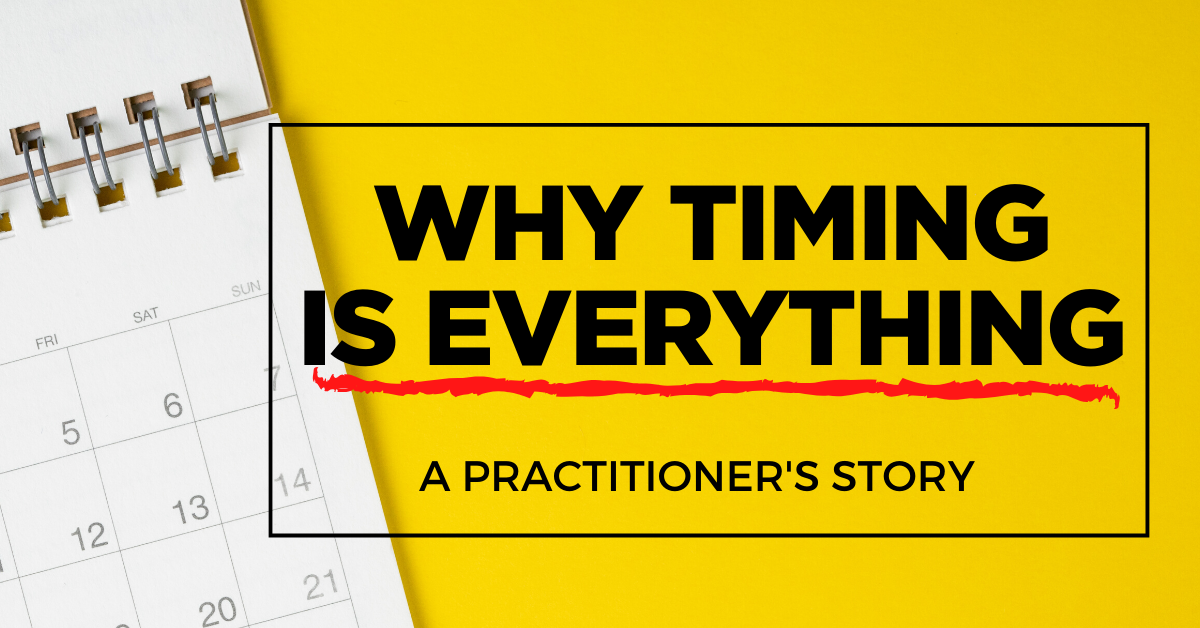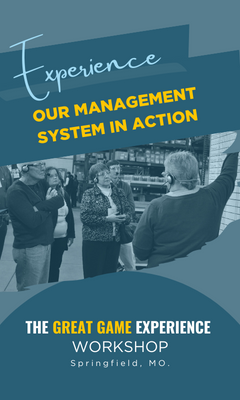
When's the best time to start playing The Great Game of Business®? For SRC, it didn’t come down to a choice.
They began playing Great Game™ back in 1983 out of desperation. It was a Hail Mary resort to save their business.
They used the system to claw their way out of an 89-to-1 debt-to-equity hole.
In the years since, many other companies have also turned to The Great Game of Business system as a last resort. Most of us are more open to change during tough times.
What’s less common, though, is companies embracing the system during good times. Why fix something when it isn’t broken, right?
The Story of Hook + Ladder
Caleb Clark and Tonny Lam, the millennial-aged founders of Hook + Ladder, a digital marketing and lead generation agency in Calgary, Alberta, used a different calculus when they decided to start playing Great Game™ in February 2020.
Their business was booming. They had just about tripled their revenues and their number of employees from 2018 to 2019. But they realized what had got them there wasn’t enough to get them to where they wanted to go.
They saw Great Game as a path to help them reach their long-term goals and impact on their community. So, they made the bold move of hiring a coach, Catherine Fitzgerald, and began implementing The Game with their team on February 23, 2020.
When Timing is Everything
Just three weeks later, on Monday, March 16, the coronavirus pandemic hit—throwing all of the company’s plans out the window.
Yet, making the investment to start practicing open-book management generated immediate dividends.
“I can’t stop thinking about how lucky we are that we started playing just weeks before the virus hit,” says Clark. “I don’t know how we would have handled it."
"Since we had opened the books and taught our people the reality of the situation, our people knew what to do. They knew what our cash runway was, and they went to work. People can handle bad news. What they can’t handle is no news.”
Lam says he feels fortunate that they have the Great Game system to lean on as they adjust to the "new normal".
“The things we expected to happen would never actually happen if we continued on the same path we were on,” he says.
“But rather than bemoan that the sky is falling, we are open to seeing what our energetic and collaborative team can accomplish together.”
A Partnership is Born
Lam and Clark met each other a decade ago when they attended business school together. They were teamed up in a marketing case competition to build a social media campaign for Canada's largest automotive group.
The prize for winning the competition was a contract to help launch its Toyota Scion brand in Canada. Their team won the competition—which got Lam and Clark dreaming of starting a marketing agency of their own.
But they were worried a startup wouldn’t support both of them financially. They were also concerned about the knowledge gap they faced in launching a startup.
So, they came up with a plan. Clark would start the business solo and hone his marketing skills while Lam would take a job with Accenture, the multinational consulting giant, to learn skills he would bring back to their business.
While they dreamed of working together soon, the reality was that it took them seven years before Lam left Accenture to join their business full-time.
The partners then steadily grew their business over the next few years employing mostly a contractor model. They mostly relied on freelancers to help them complete client work.
By 2018, though, the business had grown to the point when they were ready to ramp up their full-time team by bringing most of their work in-house.
They then doubled their 2018 revenue in 2019. Their goal was to just about double that again in 2020. To get there, they had tripled the size of their team from four employees to 12.
“We wanted to build a culture and a team,” says Lam. “We were getting better and more efficient and we were ready to take the next step.”
Searching for a Sustainable Solution
That’s when Lam remembered an experience from his time at Accenture working with the parent company of 1-800-GOT-JUNK? several years earlier. The culture was so different from all the other Fortune 500-size companies he had worked with.
“I was just blown away by how engaged everyone was every day,” he says. “They started every day with a big Huddle to discuss their Critical Number™. I had never seen such proactive bottom-up leadership and employee-owner mindset in any other large company."
"I could tell something was different and it was working well there. The morale and growth of that company compared to other companies was off the charts.”
Part of the company’s secret sauce, he learned, was that they played something called The Great Game of Business.
Getting in The Game
With their company taking off, Lam and Clark picked up copies of Jack Stack’s book and were blown away. When comparing it to all the other competing business ideas and frameworks out there, they knew this one stood apart.
“We were like, this is it!” says Clark, who played college football at Western Michigan University before earning his MBA.
“This was exactly what we were looking for. For me personally, this was the way to create that same kind of shared vision and goals that I missed from playing football.”
“I had the experience of working in a top-down environment where I never understood why decisions were made,” says Lam. “I was shielded from information. Great Game resonated with me because I didn’t want our team members to feel that way. I wanted them to have the same information we had.”
One Step at a Time
The more Clark and Lam talked about it, the more excited about The Game they were. The question then became: How should they start?
“Thanks to our bootstrapped nature, we strongly considered self-implementing,” says Clark. “But then we asked ourselves about how much time we would have to invest and other opportunity costs we might lose compared to if we just hired someone. But the cost of hiring a coach wasn’t insignificant for a relatively small business like ours.”
As it turned out, they also just lost some business—which might have made the choice to hire a coach easier.
In the end, Clark and Lam made the bold decision to hire a coach to help them get off on the best foot possible.
“We knew if this thing worked out the return on our investment would be significant,” says Lam.
“I remember it like it was yesterday when I was on the phone with Tonny and Caleb,” says Fitzgerald. “They told me, ‘We thought about this and we really want to do it right and we've decided we might only get one chance with our team to do it right. We need your help so we can focus on the details and you can help us stay on track with Great Game. We want you as our coach.”
Fitzgerald then worked with the team for the next few weeks getting their systems into place and helping them inplement The Game.
Then news of the coronavirus pandemic hit.
Moving Boldly into an Uncertain Future
Fitzgerald remembers talking to Clark and Lam in the wake of the economic shutdown as they discussed their options. She also remembers how they decided to be bold and speak the truth to their team.
“I don’t think we understood the true impact of opening our books to the team until Covid-19 hit,” says Clark.
“We immediately saw the respect and buy-in from the team because they knew we trusted them and they trusted us. It created a greater sense of togetherness and bonding. It’s allowed us to thrive.”
One of the biggest debates the team had was whether to keep their original plan for the year, or if they should adjust it based on the uncertainty of the economy moving forward.
“With Catherine’s help we realized we needed to keep our plan the way it was,” says Clark. “She coached us that the plan is the plan. Now our goal is to use it from now until the end of the year and try our best to make up the ground we’ve lost.”
Another goal Clark and Lam have in the coming years beyond building back their business is to convince others about the powerful impact you create when you open your books and play The Great Game of Business.
They want other business owners who might be overwhelmed with the number of competing frameworks to understand why they chose this one.
“When I get excited about something, I tend to talk to everyone I know about it,” says Lam. "I think everyone needs to know about Great Game.”
“And as the book says, ‘It’s the only sensible way to run a business,’” says Clark.
High-Involvement Planning Accelerator
Are you looking for a way to give
More articles & Resources you might like:
.png)








.png)




-5.png)

